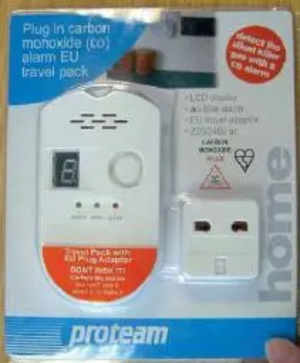Kent Trading Standards warning over faulty "killer gas" alarm

Kent Trading Standards is warning consumers about the dangers of using a 'Proteam' Carbon Monoxide Gas Alarm which cannot be relied upon to detect the so-called 'silent killer' gas. The alarm, which comes with an adapter so it can be used abroad, has been available over the last four months from high street outlets as well as via the internet and through newspapers and other mail order publications.
The alarms are sold either singly or in a pack with the travel adapter, and are claimed to sound an alarm when potentially dangerous levels of carbon monoxide gas are detected.
There are various defects with the alarms, but crucially some batches fail to detect carbon monoxide and fail to sound the alarm before consumers are exposed to potentially dangerous levels of the gas.
The instruction leaflet provided is inadequate and does not make clear how the alarm operates or what action to take if the alarm does sound.The importer of the alarms has initiated a recall on products marked with batch numbers P06/001400, P06/001474 and P06/001481 but it is feared that faulty products may still be in use in peoples' homes, or being kept for holidays abroad.
Carbon monoxide gas is a colourless, odourless, tasteless, toxic gas which can be produced by the incomplete combustion of fossil fuels - gas, oil, coal and wood - used in boilers, gas fires, water heaters, solid fuel appliances and open fires. Dangerous amounts of carbon monoxide can accumulate when -as a result of poor installation, poor maintenance or failure or damage to an appliance - fuel is not burned properly, or when rooms are poorly ventilated and the carbon monoxide gas is unable to escape.
Early symptoms of carbon monoxide poisoning, such as headaches, nausea, and fatigue, are often mistaken for flu when the deadly gas goes undetected in a home. Prolonged exposure can lead to brain damage and death.
The travel adapter plug supplied with the alarm is constructed in such a way that there is insufficient protection from access to live parts, which may leave the user at risk of electric shock.
The packaging for the alarm and travel adapter set carries the British Standards Institution (BSI) Kitemark®. This product does not carry a Kitemark licence and has not been tested by BSI. Products or services which bear a valid Kitemark symbol should display their Kitemark licence and standard number adjacent to, or underneath the symbol.
Advice from Trading Standards is to stop using the alarm immediately as it cannot be relied on to reveal toxic levels of carbon monoxide gas. Similarly, the European plug travel adapter should not be used.
Anyone in need of consumer advice can call Consumer Direct on 08454 04 05 06.